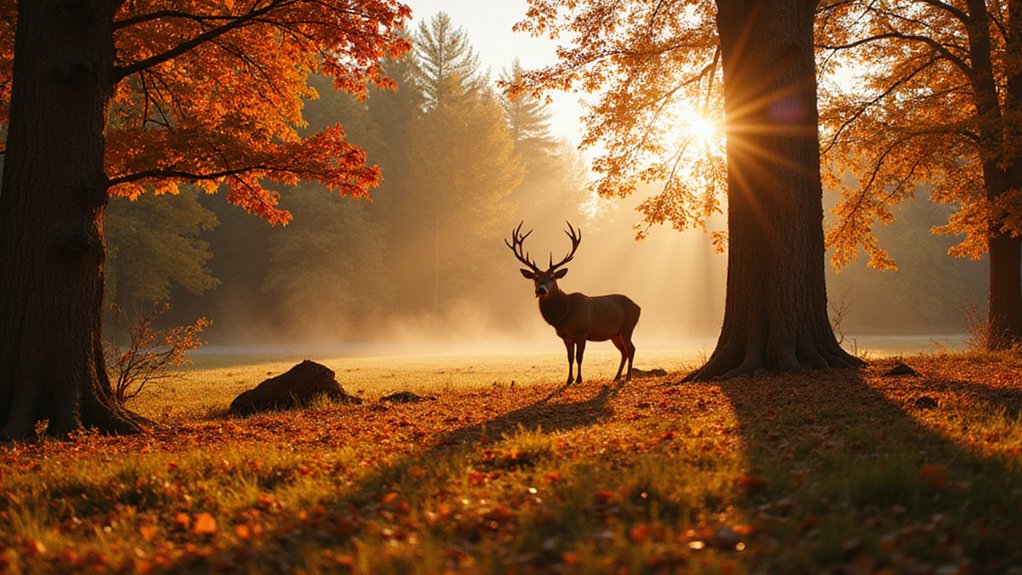When it comes to hunting seasons, understanding the rules and regulations is essential for anyone looking to participate. These seasons aren’t just random—they’re designed to protect wildlife and guarantee sustainable practices. Each state has its own specific guidelines, influenced by various factors. So, what do you need to know to stay compliant and make the most of your hunting experience? Let’s explore the key elements that define these important periods.
Hunting Seasons Explained: What Are They and Why Do They Matter?
Why do hunting seasons exist, and how do they impact wildlife management?
Hunting seasons help regulate animal populations, ensuring a balance between species and their habitats. By designating specific times for hunting, wildlife agencies can prevent overpopulation, which leads to habitat destruction and increased disease spread.
You’ll find that these seasons are based on reproductive cycles, allowing animals to thrive. Additionally, they promote sustainable hunting practices, ensuring future generations can enjoy wildlife.
Understanding hunting seasons matters because it highlights your role in conservation and responsible management, helping protect ecosystems while allowing you to engage in hunting responsibly.
What Types of Animals Are Typically Hunted During Each Season?
As you explore hunting seasons, you’ll find that different animals are targeted based on their life cycles and seasonal behaviors.
In the fall, deer are popular due to their mating season, while waterfowl like ducks and geese are hunted as they migrate.
Winter often brings small game like rabbits and squirrels, which are more active during colder months.
Spring is ideal for turkey hunting, as males are especially vocal and visible.
Each season offers unique opportunities, so understanding these patterns can enhance your hunting experience and guarantee you’re targeting the right animals at the right times.
How Do Hunting Seasons Vary by State or Region?
Hunting seasons can vary considerably from state to state and region to region, influenced by local wildlife populations, climate, and regulations.
You’ll need to check your state’s specific rules to understand when you can hunt.
Here are some key factors that affect hunting seasons:
- Wildlife management goals
- Local climate variations
- Species population health
- Public safety considerations
- Cultural traditions and practices
What Factors Influence Hunting Season Dates and Regulations?
When considering hunting season dates and regulations, several key factors come into play that directly impact when and how you can hunt.
Wildlife population levels are vital, as states adjust seasons based on species health. Weather patterns also influence timing; for example, warmer winters can alter animal behavior.
Additionally, local ecosystems and habitat conditions play a role in determining ideal hunting times. Conservation efforts and regulations aim to guarantee sustainable practices, which means you’ll need to stay informed about these changes.
Finally, public input can shape regulations, so your voice matters in the discussion surrounding hunting policies in your area.
Why Is It Important to Know Local Hunting Laws and Guidelines?
Understanding local hunting laws and guidelines is essential for guaranteeing a responsible and enjoyable experience in the field.
By staying informed, you not only protect wildlife populations but also guarantee your safety and that of others.
Here are key reasons why it matters:
- Avoid legal penalties and fines
- Promote sustainable hunting practices
- Respect wildlife conservation efforts
- Enhance your hunting skills and knowledge
- Foster a positive relationship with local communities
Knowing the rules helps you navigate your hunting experience with confidence and respect, making every outing more rewarding and responsible.
How Can You Best Prepare for the Upcoming Hunting Season?
How can you guarantee a successful hunt this season? Start by scouting your hunting area early. Familiarize yourself with the terrain, food sources, and water access.
Next, make sure your gear is in top shape—clean your firearm, check your bow, and stock up on necessary supplies. Practice your shooting skills regularly to maintain accuracy.
Additionally, review hunting regulations and licensing requirements to avoid any surprises.
Finally, consider joining a local hunting group or community for tips and camaraderie.
With proper preparation, you’ll increase your chances of a rewarding and enjoyable hunting experience this season. Happy hunting!
What Are the Conservation Impacts of Regulated Hunting Seasons?
Regulated hunting seasons play an essential role in wildlife conservation and population management. By controlling the timing and number of animals harvested, these seasons help maintain healthy populations and ecosystems.
You can contribute to conservation efforts by understanding the benefits of regulated hunting, such as:
- Reducing overpopulation and habitat degradation
- Supporting local economies through hunting-related activities
- Funding conservation programs via licensing fees
- Promoting species diversity and habitat restoration
- Fostering responsible hunting practices among enthusiasts
When you engage in regulated hunting, you’re not just pursuing a sport; you’re actively participating in the conservation of our natural resources.
How to Stay Informed About Changes in Hunting Seasons and Policies?
Are you staying updated on the latest changes in hunting seasons and policies? To keep yourself informed, regularly check your state’s wildlife agency website.
They often post updates, regulations, and important dates. Sign up for newsletters or alerts that provide timely information directly to your inbox.
Join local hunting clubs or online forums where fellow hunters share insights and updates. Social media can also be a valuable resource, as agencies frequently post announcements there.
Finally, consider attending local meetings or workshops to discuss changes with experts and stay engaged in your hunting community.
Stay proactive to guarantee a successful hunting experience!
